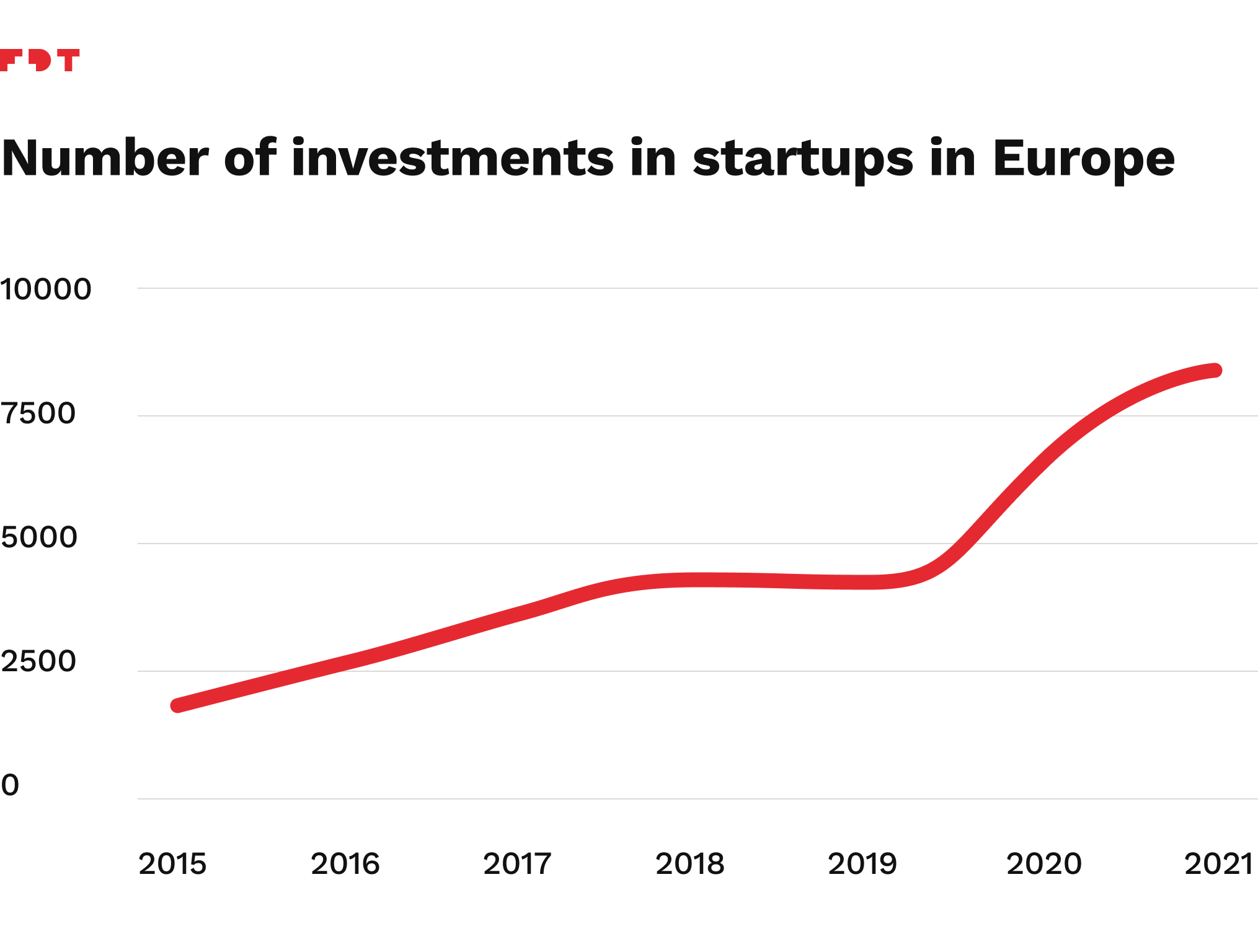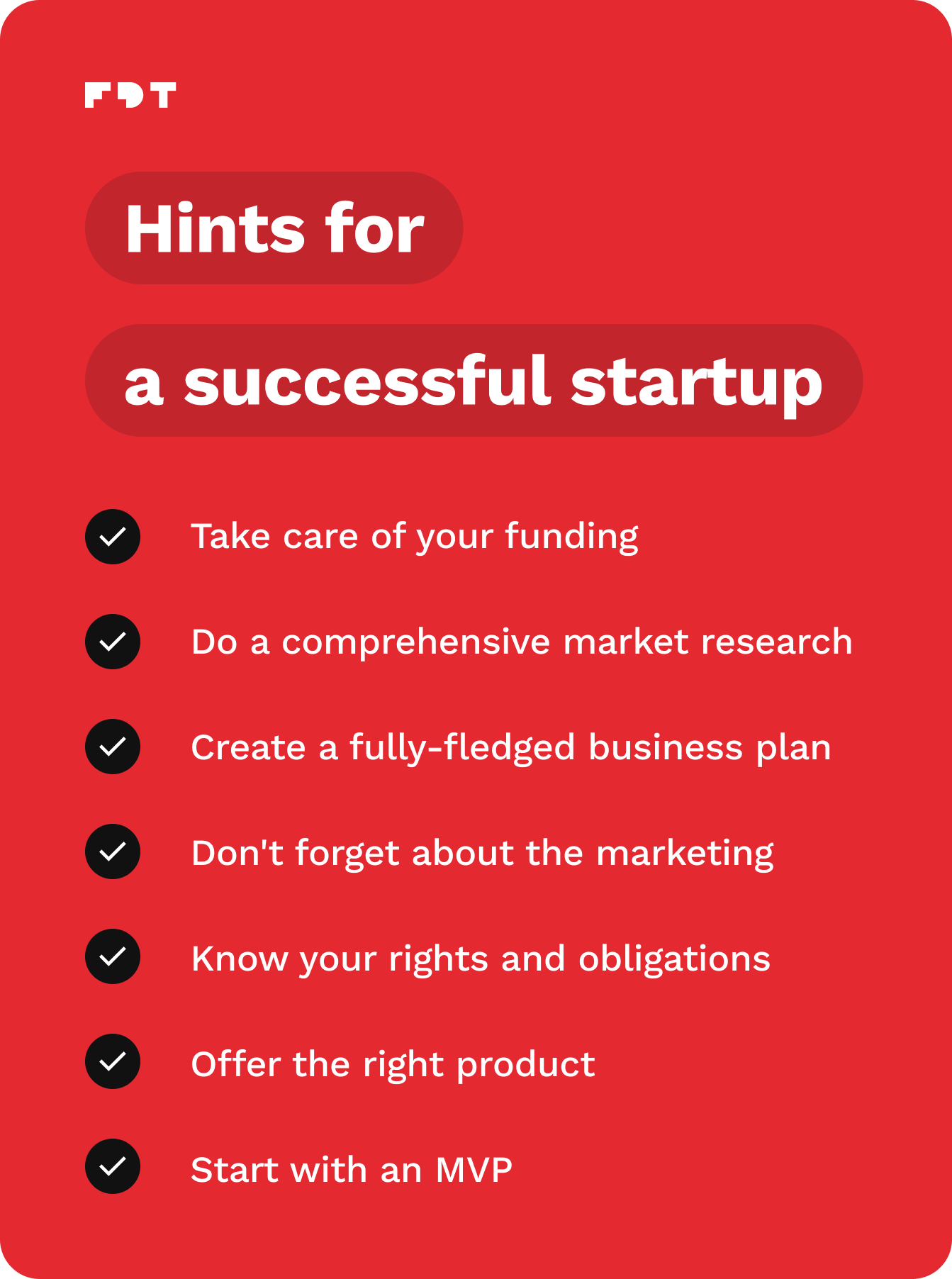
Startup statistics: how many startups have a chance to succeed?
Why do startups fail? What percentage of startups actually have a chance to succeed? How to create a successful business plan so that my path doesn’t end like most of others?
Nowadays, fintech startups, venture capital firms, small businesses and the overall startup world are some of the top topics globally. In this article you’ll find some startup statistics and facts to help you understand how many startups fail, why this happens and how to prevent it once you decide to start your own business.
Contents
Startup definitions
For the start, it’s worth mentioning that there are different definitions of startups. A definition of startup that is the closest to the truth is the one saying that it’s a company or project undertaken by an entrepreneur to seek, develop, and validate a scalable business model. To sum up, it’s a new company still searching for its business model, where the entrepreneur has an idea and needs to find out how to make it profitable. The moment it starts to make money in a predictable and consistent way, it is no longer a startup and becomes a fully-fledged business.
In this article you’ll find results from various studies and we’ll be focusing on reasons why startups fail and average numbers concerning the successes and failures of these businesses.
According to Failory, a startup usually has two important characteristics:
Innovation
A startup is testing assumptions that haven’t been tested before – sufficiently new technologies, products & services, or markets.
Growth
A startup has the potential to grow exponentially rather than linearly. It is scalable. This usually happens because technology provides leverage (usually, a marginal cost of production close to 0).

Unicorns
What are unicorns? Aileen Lee, Founder and Managing Partner of Cowboy Ventures, coined the term unicorn (often used to describe successful startups) in the TechCrunch article Welcome To The Unicorn Club: Learning from Billion-Dollar Startups, to mean specifically: a privately held startup that has a $1 billion valuation or more. It’s rather a rare situation, just like seeing a unicorn.
Successful startups and failure statistics
Let’s have a look at some facts from various sources. These startup statistics will give you a chance to understand the startup market a little more.
Although it is said that only 10% of startups can actually survive, it doesn’t mean there are no success stories. European startups reached nearly 8,400 recorded investments in 2021. In 2020, the result was approximately 6,600 and in 2019, it reached over 4,200. This clearly means that there are more and more investments in startups.
2 out of 10 new businesses fail in the first year of operations, which means that only 20% of startups don’t get a chance to grow as they close in their first year.
When it comes to second businesses, it is counted that founders of a previously successful business have a 30% chance of success with their next startup and those who have failed previously have a 20% chance.

Some of our Partners are/were also startups that have received funding rounds:
LifePlanner
After releasing the web app, they attracted investors and grew their business. It’s an online platform for personal data storage, structuring and insight. It offers a dashboard providing a digital reflection of the user's life, to be shared with family, friends and stakeholders. LifePlanner makes it easier for the family members to find all the necessary documents and information, also in case of illness and death.
The app raised NOK 1.2 million from Innovation Norway.
ParrotOne
It’s a messaging app with social networking elements that helps you type messages with much less effort. It’s a mobile multi-messaging app to make communication and remote work easier for users with less agile hands (especially the disabled and elderly). ParrotOne is an application that has won many awards and been nominated in various competitions.
This app acquired a business angel investor in 2018.
Sober Grid
This app is a sobriety social network available on all smartphones, which delivers on-demand peer support right into the hands of users in recovery from substance addiction. The app was also created to help sober travelers find friends in new cities. It is important to recognize in sobriety that you are never alone. It has reached a 4.9 app rating on App Store and 100 000+ app downloads on Google Play.
Sober Grid raised a total of $10.3 million in over 6 funding rounds.
Reasons why startups fail
Let’s now focus on the main reasons why startups fail based on Statista’s results (Main reasons for business failure among start-ups worldwide in 2021). According to the research carried out among startup owners, the main reasons for startup failures were running out of funds and no market need. The source mentions that there is rarely one reason behind a company going bankrupt, it is rather a mixture of several issues.
Lack of funds
It’s quite an obvious fact that often startups fail due to a lack of funding. They are often funded by investors who decide about their financial support. Once your solution seems as unsuccessful for them, they’ll simply cut it off. According to Statista, it’s the reason for 38% of startup failures.
No product-market fit
35% of startups fail because there was no need for their products on the market. At an early stage of business development, owners often forget about a deep market analysis to assess whether there’s a real need for the product they intend to offer.
Competition
No numbers exist that cover the precise size of the startup market. This might have to do with the mentioned difficulties surrounding the definition of what a startup exactly is, and that it varies around the world. But it’s no surprise that new businesses open every day and there’s quite a lot of competition for every person who wants to bring their idea to life. It’s sad the percentage of startups that fail by being outcompeted is 20.
Flawed business model
The lack of experience of business owners also often results in creating an underdeveloped, flawed business plan. 19% of startups fail due to mistakes concerning their business model.
Legal challenges
Legal regulations, rights and obligations of business owners can be quite complicated. Omissions or errors in documents as well as lack of knowledge of the applicable law according to startup statistics resulted in 18% of startup failures in 2021.
Poor product quality
It’s no surprise that if your business is based on a specific product, it should be of good quality. It’s said that 8% of startups fail because of poor-quality products that clients didn’t want to buy.
Lack of marketing
Not mentioned in these startup statistics, lack of marketing might also be one of the reasons why startups fail. No matter how great your product is and how useful it might occur, if people don’t know about its existence, they won’t buy it.

Run a successful startup – how to prevent failure
So, if there are so many obstacles and threats, and with such a low rate of successful startups, is it even possible to prevent a startup failure? Here’s some good advice for those who look for the right ways:
Take care of your funding
Firstly, to run a successful startup, you need funds. Depending on your business characteristics, there are different paths to take care of your finances well. For example, if you want to take advantage of the help of investors, you should do some work to be able to convince them. If they are to fund your startup, they need to be sure about your solution's viability. You should also plan the development of your product well, to be able to easily forecast costs related to it and to avoid losing money.
Start with an MVP
When it comes to software development, you should start with creating designs or an MVP, to show the first results without much investment. MVP is a minimum viable product, which means a mobile app with a minimum set of features. It’s built mostly to check the viability of the idea and see if the core features meet the requirements. So the most important matter in this case is to define the core feature as it’s the one that solves a specific problem users have. You need to focus on that problem and that feature.
Do a comprehensive market research
The market research might consist of lots of different elements and stages, depending on your purposes and your idea. Every new idea, new business and new product has goals. During the market research, you simply check if implementing your idea is worth your time and investment. If it turns out it’s not going to bring you profits, you’ll be able to resign and not lose any more time and money. Let’s not forget how much startups fail because there is no need for their product on the market.
To find out more about market research strategies, in this case for mobile app development, jump to this article.
Offer the right product
Apart from the market research, you can’t forget that the product you offer must be of great quality. So once you know that your product is actually needed and demanded, you have to make sure it’s delivered in the right way and condition.
Create a fully-fledged business plan
A successful business comes from the right plan. This is essential to be able to define all the requirements of your target audience and meet their needs. Ask yourself a question: What do I want to achieve with my business? And then try to create a plan based on the answer.
Know your rights and obligations
If you don’t have time or it’s too complicated for you to manage, ask for help regarding rights and obligations to avoid costly mistakes. Remember that starting a business might look different in various countries.
Don't forget about the marketing
Again, you can have the greatest product of all, manage a team of specialists, take care of funding, have all the needed knowledge about the law obligations and have a fully-fledged business plan… but if you don’t include marketing in it, this may also cause your startup failure. That’s why you should think about your product promotion, including advertising.

Conclusion
Based on startup failure rates divided by reasons and the above hints, I hope it’s more clear to you why such a high percentage of startups don’t manage to win their position and how to become one of successful startup owners. Remember that this all doesn’t mean that the startup world is unreachable – with a proper plan, there are many opportunities for you.







